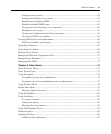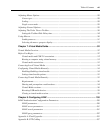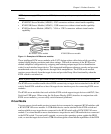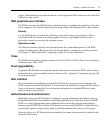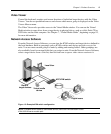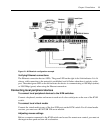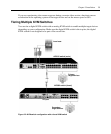
Chapter 1: Product Overview 2
NOTE: A power supply (APC part number AP5640) is needed to provide power up to four of these Serial Server
Modules.
• KVM PS/2 Server Module (AP5630) - PS/2 connectors without virtual media capability
• KVM USB Server Module (AP5631) - USB connectors without virtual media capability.
• KVM Sun Server Module (AP5632) - VGA or 13W3 connectors without virtual media
capability.
Figure 1.1: Examples of KVM server modules
These intelligent KVM server modules with CAT5 design reduce cable clutter while providing
optimal digital display resolution and video settings. The built-in memory of the KVM server
module simplifies configuration by assigning and retaining unique target device identification
codes for each attached target device. This integrated intelligence enhances security and prevents
unauthorized access to a target device through cable manipulation. The KVM server module
receives power directly from the target device and provides Keep Alive functionality when the
KVM switch is not turned on.
NOTE: A power supply (APC part number AP5640) is needed to provide power to the serial server module.
The KVM server modules enable direct KVM connectivity to target devices attached to the KVM
switch. Each KVM switch has at least 16 target device interface ports for connecting KVM server
modules.
The KVM server modules that work with the KVM switch support target devices with PS/2, Sun,
Serial and USB ports. When using the On Screen Display (OSD) interface in conjunction with
KVM server modules, you can easily switch between platforms.
Virtual Media
You can open a virtual media session to target devices connected to supported KVM switches with
a KVM USB VM server module. A USB media device can be attached to the KVM switch and
made available to any target device connected to the KVM switch with a KVM USB VM server
module. Use virtual media to move data between a target device and USB media devices connected
to the KVM switch. You can install, upgrade, or recover the operating system; update the BIOS
code; or start the target device from a USB drive through the virtual media capabilities of the KVM
KVM PS/2 server module
KVM USB server module





